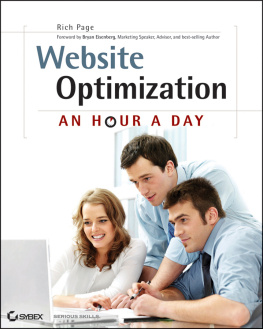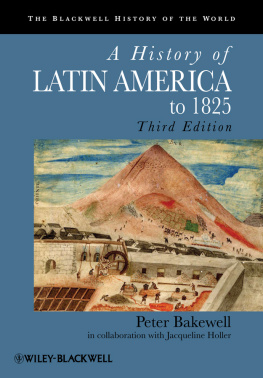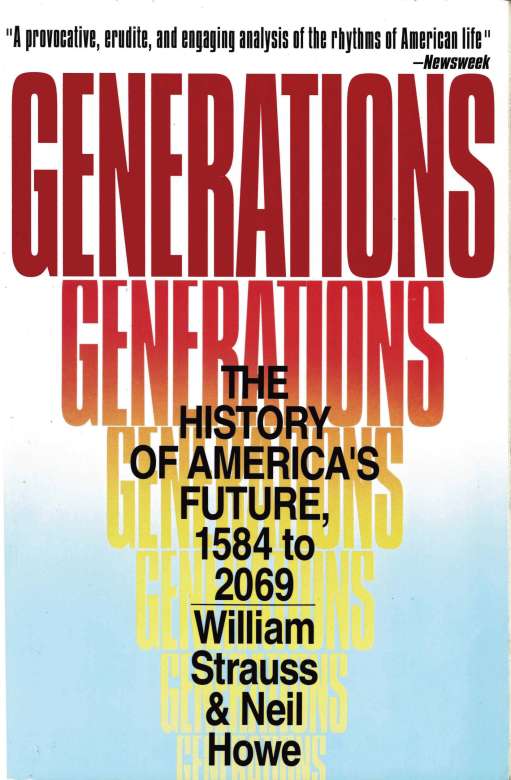Copyright 1991 by William Strauss & Neil Howe
All rights reserved. No part of this book may be reproduced or utilized in any form or by any means, electronic or mechanical, including photocopying, recording, or by any information storage or retrieval system, without permission in writing from the Publisher. Inquiries should be addressed to Permissions Department, William Morrow and Company, Inc., 195 Broadway, New York, NY 10007.
It is the policy of William Morrow and Company, Inc., and its imprints and affiliates, recognizing the importance of preserving what has been written, to print the books we publish on acid-free paper, and we exert our best efforts to that end.
Library of Congress Cataloging-in-Publication Data
Strauss, William.
Generations : the history of Americas future, 1584 to 2069 / Willaim Strauss and Neil Howe. 1st. ed. p. cm.
Includes bibliographical references and index.
ISBN 0-688-11912-3 (pbk.)
1. Unites StatesHistory. 2. GenerationsUnited States History Neil. II. Title.
[E179.S89 1992]
973dc20
. I. Howe,
92-8222
CIP
Printed in the United States of America
oo

To our grandparents and grandchildren , whose lives will touch parts of four centuries


Preface
In a recent survey, new college graduates listed history as the academic subject whose lessons they found of least use in their daily affairs. In part, this reflects the show-me pragmatism of todays rising generation. Yet as America embarks on the 1990s, people of all ages feel a disconnection with history. Many have difficulty placing their own thoughts and actions, even their own lives, in any larger story. As commonly remembered, history is all about Presidents and wars, depressions and scandals, patternless deeds done by people with power far beyond what the typical reader can ever hope to wield. If history seems of little personal relevance today, then what we do today seems of equal irrelevance to our own lives (and the lives of others) tomorrow. Without a sense of trajectory, the future becomes almost random. So why not live for today? Whats to lose?
During the 1970s and 1980s, this today fixation has rumbled throughout American society, top to bottom. Our Presidents and Congresses have expressed a broad-based preference for consumption over savings, debt over taxes, the needs of elders over the needs of children. In our private lives, we have seen the same attitude reflected in parents-come-first family choices, adults-only condos, leveraged Wall Street buy-outs, and the live-fast, die-young world of inner-city drug dealers. All these actions are more of a piece than many of us may feel comfortable admitting.
We offer this book as an antidote. More fundamentally, we hope to give our reader a perspective on human affairs unlike anything available in the usual history and social science texts. Once you have read this book, we expect you

PREFACE
will reflect differently on much that you see in yourself, your family, your community, and the nation. You may understand better how the great events of American history, from wars to religious upheavals, have affected the lifecycles of real people, famous and common, in high political offices and in ordinary families. You may also gain a better sense of how you and your peers fit into the ongoing story of American civilizationa long and twisting human drama that offers each generation a special role. Appreciating the rhythm of this drama will enable you to foresee much of what the future holds for your own lifecycle, as well as what it holds for your children or grandchildren after your own time has passed.
This book presents the history of the future by narrating a recurring dynamic of generational behavior that seems to determine how and when we participate as individuals in social changeor social upheaval. We say, in effect, that this dynamic repeats itself. This is reason enough to make history important: For if the future replays the past, so too must the past anticipate the future.
We retell a favorite old tale in a brand-new way: the full story of America from the Puritans forward, presented along what we call the generational diagonalthe lifecycle course, childhood through old age, lived by the discrete birthyear groups we define as generations. We identify eighteen such generations through four centuries of American history, dating back to the first New World colonists. Among these generations, we find important recurring personality patternsspecifically, four types of peer personalities that have (in all but one case) followed each other in a fixed order. We call this repeating pattern the generational cycle. The cycle lies at the heart of our story and offers, we believe, an important explanation for why the story of America unfolds as it does. Read together, our eighteen generational biographies present a history of the American lifecycle and a history of cross-generational relationships. These relationshipsbetween parents and children, between midlife leaders and youths coming of age, between elders and their heirsdepict history as people actually live it, from growing up in their teens to growing old in their seventies.
One of these eighteen American generations, of course, is yours. All but the very oldest or very youngest of our contemporary readers belong to one of the following four generations:
G.I. elders, bom 1901-1924, age 66 to 89 as 1991 begins;
SILENT midlifers, bom 1925-1942, age 48 to 65;
BOOMER rising adults, bom 1943-1960, age 30 to 47;
13ER youths, bom 1961-1981, age 9 to 29.
In this book, we describe what we call the peer personality of your generation. You may share many of these attributes, some of them, or almost none

PREFACE
of them. Every generation includes all kinds of people. Yet, as we explain in Part I, you and your peers share the same age location in history, and your generations collective mind-set cannot help but influence youwhether you agree with it or spend a lifetime battling against it.
For the moment, lets suppose you share your peers mind-set. If so, here is how you might respond to the message of this book.
If you are a G./., your own collegial identity is so powerfuland has left such a colossal lifelong imprint on Americas political, social, and economic institutionsthat you tend to see older and younger generations as ineffectual facsimiles of your own. You may therefore resist our contention that other living generations are intrinsically different. But make no mistake: G.I.s have a distinct character. Of all four of our basic peer personalities, your Civic type is probably the most crisply defined, and the boundaries separating G.I.s from the Lost and the Silent are among the most compelling in American history. As firm believers in public harmony and cooperative social discipline, many of you might read into this books plural title a disturbing message of discord. Possessed of a hubris bom of youthful optimism fulfilled, perhaps you will puzzle over one of our core premises: that generations, like people, can relate to one another in ways which may not be mutually beneficial. Collectively, you G.I.s grew up so accustomed to being looked upon (and rewarded) as good, constructive, and deserving that you have had trouble, later in life, understanding how others might be viewed and treated differentlyand how others might view themselves differently. All aging Civic generations have had this trouble, including the peers of Cotton Mather and James Blair in the late 1720s and the peers of Thomas Jefferson and James Madison in the early 1820s.


















